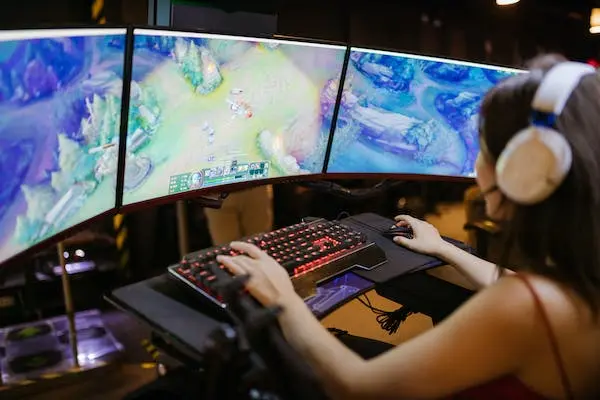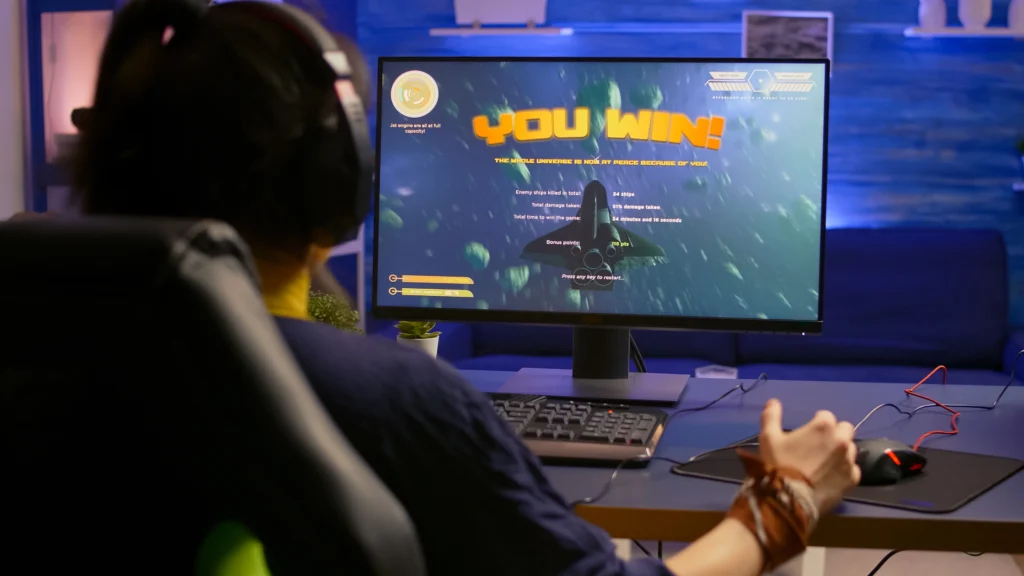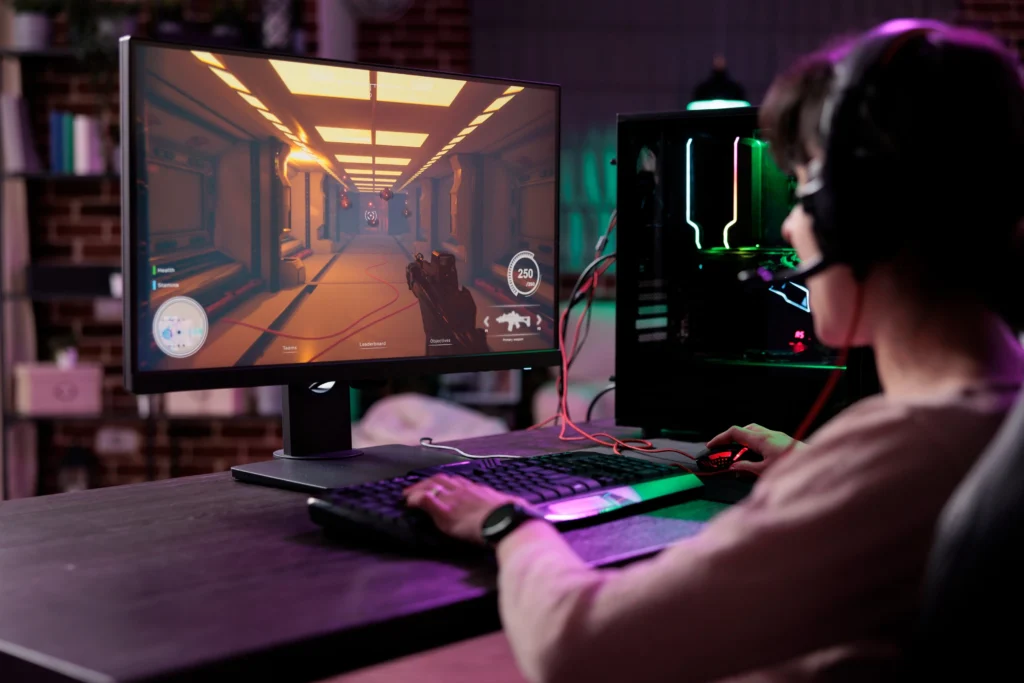Choose the Best Game Engine for You: A Beginner’s Guide 2024

Selecting the right game engine as an indie game developer can be a daunting decision, particularly for newcomers. As game development has become an increasingly popular passion and profession, a multitude of game engines – both free and paid – have emerged, each one touting their unique features and capabilities. Some engines promise powerful 3D visualizations, while others emphasize user-friendly interfaces for 2D games. This makes it difficult to find what is the best game engine for beginners.
For newcomers starting to build their first game, it’s crucial to understand which game engine best aligns with their skill level, game project, and budget. Whether your aim is to create a casual game to enjoy with friends, or if you aspire to create the next big viral game, choosing the right game engine is foundational towards the project. This blog post seeks to help aspiring game developers to navigate the wide array of choices, emphasizing key considerations and spotlighting engines that are known for their accessibility, ease of learning, and robust features.
Table of Contents
- 1 The Crucial Role of Game Engines in Game Development
- 2 Factors Beginners Should Look For in a Game Engine
- 3 Diving into 3D: Making Complex Game Development Accessible
- 4 2D Game Development: A Great Starting Point for Newcomers
- 5 Free vs. Paid: Understanding the Trade-offs in Game Engines
- 6 Conclusion: Looking Ahead in Game Development for Beginners
The Crucial Role of Game Engines in Game Development
The foundation of every video game lies in its game engine. At its core, a game engine is a software framework designed to help create a develop video games. Think of it as a toolkit which allows developers to more easily bring their digital worlds to life, create compelling stories and narratives, and make engaging gameplay mechanics.
Game engines are more than just back-end tools. They impact all aspects of a game’s universe. For example, the game engine works behind the scenes to create realistic water reflections in a game, or the feel of a perfectly timed jump in a game. It is able to translate lines of code into the immersive experiences that we enjoy.
For beginners, diving into game development without a game engine would be akin to attempting to construct a skyscraper using your bare hands. You would need to write all the code, the rendering, physics simulations, and audio integrations by yourself which could quickly become overwhelming. A good game engine takes all those features needed for a game, and provides a structured environment in order to allow developers to focus on the creative aspects of game design while the engine handles the heavy technical lifting.
And game engines offer more than just simplification of the process. They provide developers, including beginners, with tools so that they can push boundaries. With the right game engine, developers can create dynamic lighting effects, complex AI behaviors, and intuitive player controls. This levels the playing field, allowing even those who are new to game development to produce games that are visually stunning, responsive, and above all, fun to play.
At a high level, game engines provide the toolkit needed to bring games to life. They simplify the process and make game development more accessible and rewarding for everyone.
Factors Beginners Should Look For in a Game Engine
For a beginner game developer, getting started in game design can be especially overwhelming. With the numerous game engines that are available today, each with their own distinct features and capabilities, how does a beginner figure out which one is right for them? Here’s a guide highlighting some of the important factors beginners should consider when choosing a game engine.
1. Simplicity vs. Capability: Beginners should look for a game engine that offers an easy-to-understand interface and a user-friendly experience. For example, engines that have visual scripting or drag-and-drop functionality can be easier to understand than learning a full programming language from scratch. However, it’s also important to remember that while an engine might be simple to get started with, it should also offer depth and advanced features for more complex games as the developer’s skills improve.
2. Cost: Budget plays an important role, especially for indie developers and hobbyists. Many engines offer free versions for creators to use, but often come with caveats. It’s crucial that developers understand the actual cost to develop their games, including any hidden fees, royalties, or financial thresholds that might come into play as your game gets popular and gains more players. The last situation a developer wants to find themselves in is being blindsided by unforeseen costs after investing countless hours into their project, or getting hit with a huge bill after accidentally going viral.
3. Learning Resources: An active community can be a huge help for new developers. Forums, tutorials, and online resources are invaluable for solving bugs, overcoming issues, and learning the engines. Beginners should try to find engines with vibrant communities, as these not only offer technical support, but also provide networking opportunities with fellow developers.
4. Flexibility and Scalability: While beginners might start with a small project, it’s important to find an engine that can scale and allow for more complex games down the line. As developers gain experience, they may want to build more features into their games, such as multiplayer, using VR, or complex AI, and the engine should be able to grow with the developer’s needs.
In conclusion, choosing the right game engine is a pivotal step for a game developer. Developers will likely make more than one game after they learn the engine basics, so it’s important to ensure that they choose the right tools for their needs.
Diving into 3D: Making Complex Game Development Accessible
3D game development, with its realistic visuals and immersive worlds, is often what many think of when they play games today. However, for beginners, making the leap from 2D games to 3D games can seem quite daunting, especially taking into account the intricate coding, advanced graphics, and complex physics. So what’s the easiest 3D game engine for beginners who want to get started?
When making a 3D game, oftentimes, realism and immersion are important features to consider. This makes 3D game engines an indispensable tool to use, as they simplify the process of creating three-dimensional worlds, providing developers with easy-to-use interfaces and tools to sculpt, texture, and animate. However, not all 3D engines are created equal, especially when it comes to what beginners need.
For a developer that’s just getting started, the best 3D game engine should offer an accessible platform that doesn’t compromise on features. For example, offering visual scripting or drag-and-drop functionalities allows beginners to navigate through the engine’s environment without feeling overwhelmed.
It’s also important to understand what the community looks like and what learning resources are available. 3D games can be quite complex and so having a supportive community and readily available tutorials can help beginners to circumvent pitfalls and finish their 3D games.
Ultimately, one of the advantages of 3D game development is in the ability to bring games to life in realistic detail. With the right game engine, even those that are new to game development can make intricate worlds and compelling stories. As technology continues to evolve, making 3D game development becomes ever more accessible, and opens the doors for even more creators to try bringing their imaginations to life.
2D Game Development: A Great Starting Point for Newcomers
For many new game developers, 2D game development is a more approachable way to starting a project. And historically, there are many classic and viral games that have utilized a 2D world. So what makes 2D games such an ideal starting point for beginners?
Well, to start, 2D games are inherently simpler in structure than 3D games. This is because these games primarily focus on the x and y axes, eliminating the complexities that come with having a third dimension. Basic game mechanics like physics, collision detection, and sprite animations become easier to use when just looking at games from a 2D perspective, making it easier and faster for beginners to get started with the basics of game design.
When beginners are looking for 2D game development, they should look for user-friendly features. Whether it’s a no-code system or a drag-and-drop engine, these allow for even those with limited to no coding background to immediately get started making a game. There are some game engines that emphasize the ease-of-use and streamlined workflow for developers. These are important features when considering the easiest game engine to use, or the best 2D game engine for beginners.
Notably, the current gaming landscape has seen a resurgence of pixel art and retro-styled games. This demonstrates that 2D games are not just games played in the past, but they can be popular and relevant even today. While 3D games might emphasize realism and graphics, 2D games can provide charm, nostalgia, and timeless gameplay mechanics.
Related Blog: The Best No Code Game Engines for 2D and 3D Games
In other words, while 3D games are undeniably alluring, 2D games remain an essential and long-lasting medium for game developers. For those who are new to game development, 2D allows for a blend of simplicity and creativity, and remains a great starting point.
Free vs. Paid: Understanding the Trade-offs in Game Engines
One of the biggest considerations in choosing a game engine comes down to cost. There are a wide range of both free and paid options available, so it’s important to understand the trade-offs between the different categories. So when looking for what is the best game engine for beginners, it’s important to weigh the pros and cons of both free and paid platforms.
Free game engines are immensely popular, especially for new creators and indie developers. The obvious advantage is not requiring any upfront financial investment, which is particularly appealing for those on a tight budget or those who are just getting started and want to test the waters of game development. These easy to learn game engines often have comprehensive documentation, many online tutorials, and supportive communities, which make them an excellent choice for beginners who are willing to self-learn.
However, there are downsides as well. Some free engines may have limitations on more advanced features, or they might impose restrictions on how you can monetize your game. Also, they may lack some of the polish or performance optimization that paid alternatives can provide.
On the other hand, paid game engines often come packed with advanced tools, professional support, and regular updates. These engines can be great for beginners and professionals, meaning they can scale as developers gain more experience in making games. The trade-off, naturally, is the cost, which might include a one-time fee or ongoing subscription charges. This can be a hard pill to swallow for those who have less budget, or who are just getting started.
Related Blog: Learn How to Make HTML5 Games Online
In conclusion, developers should consider many different factors when deciding on whether they want to use a free or paid engine. Free game engines can be an accessible entry point, while paid ones can provide more comprehensive features for serious development. It’s important to assess your own personal goals, budget restraints, and long-term aspirations when making a choice.
Conclusion: Looking Ahead in Game Development for Beginners
Making a game can be a lifelong endeavor filled with both challenges and rewards. For beginners who are looking to carve a niche for themselves, the future of game development is bright with immense potential, and exciting advancements and opportunities to innovate still to come.
Choosing the right game engine builds the foundation for any aspiring game developer. When considering what is the best game engine for beginners, or what is the easiest 3D game engine, there are many different factors to consider. There are many different options, and developers need to understand their own personal aspirations, project requirements, and budgetary constraints to make a decision.
It’s also important to note that the industry can change rapidly. For example, recent changes by major game engines like Unity underscore the need for adaptability. Developers need to stay updated with the latest news and trends in order to stay a step ahead, and take advantage of new opportunities.
These kinds of changes have made open-source platforms more compelling as they are open to use and not controlled by a single entity. Some platforms, like Moddio, are completely changing the game development process. Moddio provides an in-browser editor for real-time collaborative game development, so multiple developers can work on a game together. They also provide all the tools needed for multiplayer games, like netcode and server orchestration, for free. This makes it an excellent platform for beginners and advanced developers alike.
Looking forward, it’s exciting to see what is still to come for game development. For every new creator, there is a world of opportunities ahead, waiting to be seized. With passion, determination, and the right set of tools, it is truly easier than ever to make your imagination come to life.



